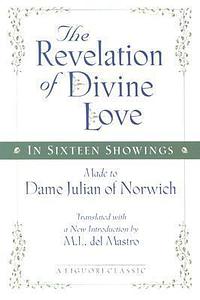Take a photo of a barcode or cover
122 reviews for:
The Revelation of Divine Love in Sixteen Showings Made to Dame Julian of Norwich
M.L. del Mastro, Julian of Norwich
122 reviews for:
The Revelation of Divine Love in Sixteen Showings Made to Dame Julian of Norwich
M.L. del Mastro, Julian of Norwich
challenging
hopeful
mysterious
slow-paced
Interesting theology, wavering into unorthodoxy, but still fascinating. Took me months of reading pieces; very slow.
I can't give this one a rating because it is a historically and theologically relevant text which I, as a non-believer, don't feel equipped to speak on.
I will say though that I was struggling a bit with the long text after reading the short text first. It gets very repetitive and except for a view passages with some vivid imagery has little to offer non-christians.
I will say though that I was struggling a bit with the long text after reading the short text first. It gets very repetitive and except for a view passages with some vivid imagery has little to offer non-christians.
challenging
reflective
reflective
I loved reading the visions of Julian of Norwich over the last few months. It was so neat knowing that this work is the oldest known manuscript written by a woman in English. I especially loved her last several showings where she referred several times to "Jesus Our Mother." Her final addition was also powerful, when after 15 years of reflecting on the visions she'd received and recorded, it was revealed to her that the ultimate purpose of these showings was love. Who were they from? Love. For what purpose? Love.
I just wish we could have this writing canonized with other scripture, so we can discuss it in Sunday school, along with other prophetesses.
I just wish we could have this writing canonized with other scripture, so we can discuss it in Sunday school, along with other prophetesses.
Parts of this were amazing, parts of this were weird, parts of this seemed heretical....I also read and listened to it very quickly to finish it for book club so I’m sure I would get more out of it reading it slowly and more devotionally. Someone in book club suggested reading it during Eucharistic Adoration and I think I may try that! There were some parts of this book that make me not as surprised that she is not canonized as a saint in the Catholic Church. I still think it is worth reading, but just be prepared for a few weird things.
The title drew me to this book, and I was not disappointed. Love radiates from Julian’s prose and embalms the wandering nature of my faith.
inspiring
reflective
slow-paced
challenging
dark
emotional
hopeful
inspiring
mysterious
reflective
slow-paced
Julian's writing seem very simple, and her conclusions somewhat obvious, but she is still an interesting read. She's one of the earliest female theologians we have, and she was illiterate. Her insights came from visions and dreams interpreted through a deep love for Christ and the teaching of the church. Her vision of the hazelnut and her ponderings on Mary struck me and I have been thinking about them a lot ever since.



